NEW GAME PLUS. Critical Thinking with Video Games
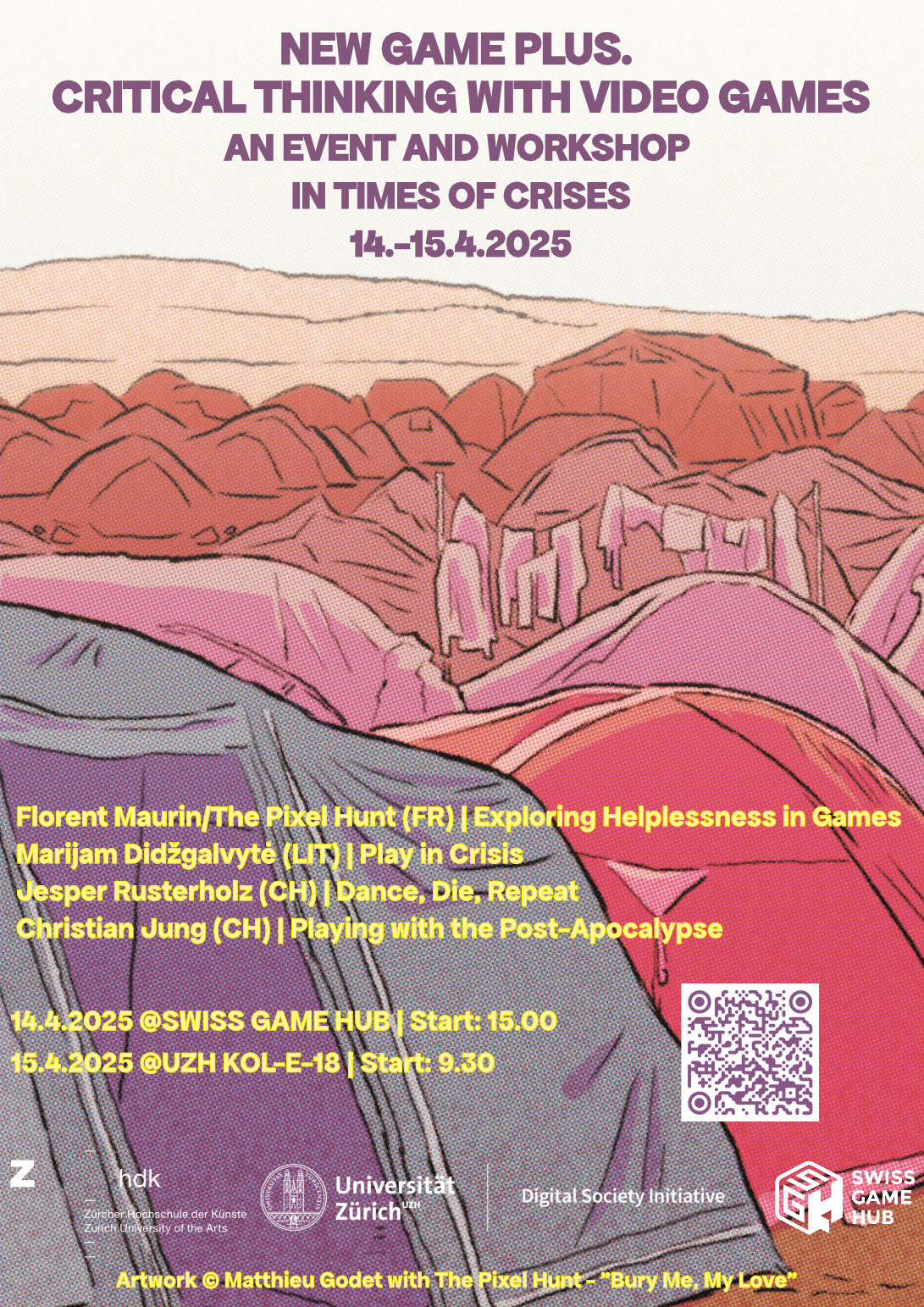
23. March 2025
Join us at this amazing event and workshop this April if you want to discuss the critical potential of video games in our current conjuncture of multiple global crises.
NEW GAME PLUS.
As (pop) cultural media, video games are more relevant than ever in times of global crises. They are not “free of ideology” or to be understood as autonomous works of art. They are always tied to historical moments, cultural discourse and material realities that affect the world, recipients and producers. Culture seeps into the code, proactively or unknowingly, and must therefore be considered and criticized at any time.
Games often show the recipients worlds that they are supposed to explore and interact with. These worlds are tied to aesthetics as well as ideologies that may not always be apparent at first glance but continue to stay in dialogue with us and our personal (real) worlds.
Additionally, material realities remain endangered in 2025. Existential catastrophes are already underway. This political relevance is evident in indie games as well as larger productions, in hate-filled online debates, but also in questions about global capitalism and its impact on the distribution of material goods. Diversity in character editors often leads to hate comments, lists of “ideologically woke” games are created, game studios are closed, and mass layoffs have become the norm in the industry. Games are being instrumentalized for war purposes and, at the same time, offer spaces and publics of resistance.
At this interactive conference, Hiloko Kato’s and Andrea-Luca Bossard’s aim is to ask how (social) sciences and video games can be critically analysed in tandem to analyse contemporary crises. The idea is that the participants and speakers will not “only” listen to lectures but will also exchange ideas with each other in workshop-style sessions.
When / Wann: Day 1: April 14 & Day 2: April 15, 2025, 15:00-19:15 & 09:30-14:45
Where / Wo: Day 1: Swiss Game Hub, Erika-Mann-Strasse 1, 8050 Zürich & Day 2: University of Zurich, KOL-E-09, Rämistrasse 71, 8001 Zürich
Language / Sprache: English
Anmeldung&Eintritt / Registration&Fee: none
Organisation: ISEK – Popular Culture Studies UZH & DSI Community Gaming
Contact: andrea-luca.bossard@uzh.ch | hiloko.kato@ds.uzh.ch
Streaming: Infos follow soon.
Programm:
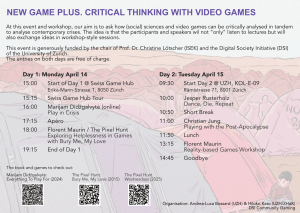
Speakers
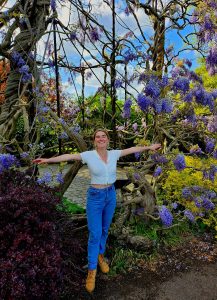
Marijam Didžgalvytė
Play in Crisis – The Industry is Killing Videogames, Reactionaries Benefit. What’s to Do?
Our leisure time is on life support – it is not yet completely destroyed, but has been colonised into a profitable network of little destructions. Malevolent industry habits chip away at what could have been a thriving creative landscape for videogames. Meanwhile, reactionary forces thrive in the vacuum, weaponising gaming spaces to entrench exclusion and exploit material frustration. If play is to remain a space of possibility rather than just another site of corporate extraction and ideological warfare, we must fight to reclaim it – before it’s too late.
Join me for a critical cultural and historical examination of the current state of the videogame industry and the urgent need for a counter-hegemonic vision. Drawing on Adorno’s, Benjamin’s, and Stuart Hall’s theories cultural production, we will unravel how games are shaped by – and can shape – the ideological struggles of our time.
Bio: Marijam Didžgalvytė is a Lithuanian-Tatar games industry critic dissecting the intersection between videogames and IRL politics. Her work has been published by the Guardian, VICE, GamesIndustry.biz, Rosa Luxemburg Stiftung and others. Marijam was a Lecturer at Royal Holloway, University of London, and is currently a Senior Marketing Executive at a Bafta-winning videogames studio. She is an author of “Everything To Play For: How Videogames Are Changing The World” published by Verso Books. The book has been titled as one of the Best of 2024 by The Guardian, has received accolades from Publishers Weekly and the Art Review. It’s being translated into 7 languages.
In the past, Marijam served as the Chair of Communications Committee for Game Workers Unite International – an organisation that assisted the global push for unionisation in the videogames industry; she also co-founded GWU UK – the first legal trade union that has come out of the movement. Didžgalvytė’s expertise lies in researching historical materialism and fine art criticism and applying them to the developments in the gaming sphere.
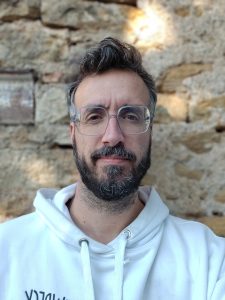
Florent Maurin
Exploring Helplessness in Games with Bury Me, My Love (Keynote)
Video games are often built around power fantasies, designed to make players feel strong and ensure nothing stands in the way of their victory. But when developing Bury Me, My Love—a game about a young Syrian woman trying to escape her war-torn country in search of a better life—Florent had to challenge those conventions. How do you make the profound helplessness that migrants experience into something playable? Here, he explains how he tackled that complex challenge.
Designing Reality-Inspired Games (Workshop)
Game ideas can come from anywhere — even from the world around us. In this workshop, game designer Florent Maurin explores what reality-inspired games are, how they work, and the key questions to consider when designing one. By the end of the session, every participant will have to present a pitch!
Bio: Florent Maurin graduated from Lille’s journalism school (France) in 2002 and worked as a journalist for ten years. He then founded The Pixel Hunt, a game development studio focused on reality-inspired games. The studio’s main titles include Bury Me, My Love (with Figs and Arte), Inua: A Story in Ice and Time (with IKO and Arte), The Wreck, and Wednesdays (with Pierre Corbinais and Arte).
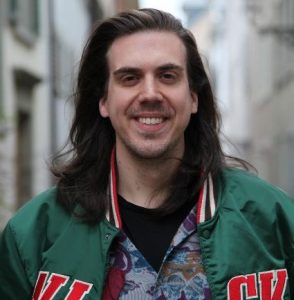
A storm that shrinks the battlefield, a dance that wins the fight—Fortnite is a game of survival and self-expression. Through its spatial aesthetics and gameplay, the world of Fortnite unfolds as a lucid fusion of liminality, leisure, and ludic warfare.
Bio: Jesper Rusterholz is a master’s student in cultural studies and film studies. As a former bookseller and librarian, he works with Prof. Dr. Christine Lötscher as a research assistant and is employed at Filmbulletin in Zurich. His research interests include short films, horror films and video games, Taylor Swift, and public restrooms, as well as topics related to aesthetics, poetics, poiesis, queering, coming of age, ghosts, trauma, and resilience.
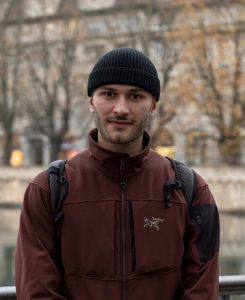
Christian Jung
Playing with the Post-Apocalypse: Radiated Ecologies and Environmental Politics in Fallout: New Vegas
Applying an ‘ecocritical’ approach to video games, this presentation examines Fallout: New Vegas (2010) as a profoundly environmental video game, whose post-apocalyptic landscapes become arenas for multispecies habitat and consequential environmental politics. The Mojave Wasteland in which the game is set is characterised by radiated ecosystems, mutated wildlife, and resource struggles which force the players to actively engage with more-than-human worlds and environments. The game therefore carves a speculative space for reflecting on ”the arts of living on a damaged planet“ (Anna Tsing et al. 2017) and the politics of survival in radically altered ecological futures.
Bio: Christian Jung is currently finishing his Master in Human Geography and Modern History at the UZH. He works as Research Assistant for Global History and Digital Humanities at the Chair for History of the Modern World at the ETH where he engages with topics such as multispecies histories and environmental media. He also works as a research assistant for urban geography at the Chair of Social Geography and Urban Studies at the UZH with a focus on global development programmes in the field of climate resilience. His general areas of interest are the politics of knowledge in relation to environmental change and urban development as well as spatial media.


